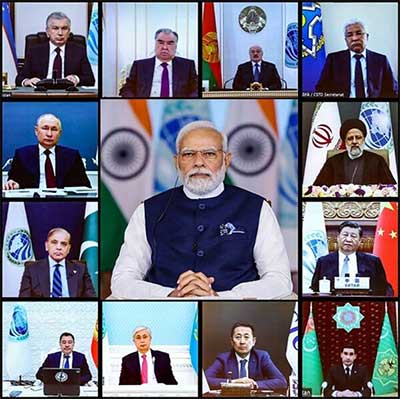Date : 08/07/2023
Relevance – GS Paper 2 – International Relations – Regional and International Organizations and Summits
Keywords – Eurasian region, territorial integrity, connectivity projects, New Delhi Declaration, strategic autonomy, Belt and Road Initiative (BRI)
Context –
Recently, Prime Minister Narendra Modi hosted the summit meeting of the Shanghai Cooperation Organisation (SCO), a multilateral organization comprising countries from the Eurasian region. The virtual summit was attended by China's President Xi Jinping, Russia's President Vladimir Putin, and Pakistan's Prime Minister Shehbaz Sharif.
Background and Significance of the SCO:
- The SCO was founded in 2001 by Russia, China, the Kyrgyz Republic, Kazakhstan, Tajikistan, and Uzbekistan.
- India joined at the leadership level in 2009 and became a full member, along with Pakistan, in 2017.
- The SCO aims to foster cooperation in various areas, including security, trade, culture, and counterterrorism.
India's Hosting Challenges and Optics:
- Due to strained ties with China and Pakistan, India opted for a virtual summit instead of an in-person gathering in New Delhi.
- The previous SCO foreign ministers' meeting witnessed tensions as External Affairs Minister S Jaishankar criticized Pakistan's Bilawal Bhutto Zardari's association with terrorism.
- India's strained ties made it challenging to host an in-person summit, but it offered an opportunity to engage with countries outside the Western bloc.
India's Strong Statements on Terrorism and Territorial Integrity:
- Prime Minister Modi addressed the issue of cross-border terrorism and called for criticism of countries using it as a policy instrument.
- He emphasized the need to respect sovereignty and territorial integrity during the execution of connectivity projects, referencing the China-Pakistan Economic Corridor (CPEC).
Pakistan and China's Responses:
- Pakistan's Prime Minister Shehbaz Sharif highlighted the fight against terrorism, urging against using it for diplomatic point-scoring and emphasizing the importance of protecting minority rights.
- Shehbaz emphasized the UN Security Council resolutions as a framework for resolving regional disputes.
- Chinese President Xi Jinping called for dialogue, respect for core interests, and rejection of external attempts to create a new Cold War or camp-based confrontation.
Russia's Support and Concerns:
- Russian President Vladimir Putin expressed gratitude for SCO leaders' support and mentioned external forces attempting to create hostility with Ukraine.
- Putin appreciated India's understanding and support in defending its constitutional order.
New Delhi Declaration and India's Stances:
- The New Delhi Declaration did not include support for China's Belt and Road Initiative (BRI), which India opposes due to concerns over the China-Pakistan Economic Corridor.
- India also refrained from signing the SCO Economic Development Strategy that carried Beijing's influence.
- The declaration focused on joint efforts against terrorism and prevention of religious intolerance, nationalism, and discrimination.
Strategic Autonomy and India's Diplomatic Position:
- India hosting the SCO summit showcases its strategic autonomy in engaging with countries beyond the Western bloc.
- The summit's timing after the PM's visit to the US demonstrates India's diplomatic stance amidst the Ukraine conflict and US-China polarization.
- While India faces challenges due to bilateral divergences with China and Pakistan, it aims to strengthen ties with other SCO countries, particularly in Central Asia.
Conclusion:
India's hosting of the virtual SCO summit marked a significant diplomatic event, providing a platform for engagement with regional powers. Prime Minister Modi's emphasis on terrorism, territorial integrity, and connectivity projects reflected India's stance on key issues. By hosting the summit, India demonstrated its strategic autonomy while navigating challenges posed by bilateral disputes. As an aspiring UPSC candidate, understanding India's participation in multilateral forums like the SCO is crucial for grasping the nation's foreign policy dynamics and strategic aspirations.
Probable Questions for UPSC Mains Examination –
- The Shanghai Cooperation Organisation (SCO) has emerged as a significant platform for regional cooperation. Discuss the implications of India's hosting of the virtual SCO summit, highlighting the challenges and opportunities it presents for India's foreign policy. (10 Marks, 150 words)
- Analyze India's stance on key issues such as terrorism, territorial integrity, and connectivity projects during the virtual SCO summit. Examine the significance of India's refraining from supporting China's Belt and Road Initiative (BRI) and its implications for India's strategic autonomy. (15 Marks, 250 words)
Source – Indian Express







